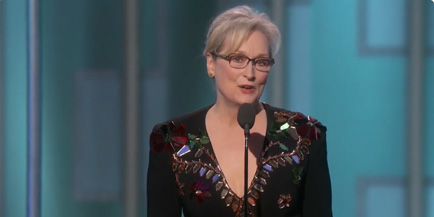They Shoot Oscar Prognosticators, Don't They?
Op-Ed: The La La Land Oscars in the Age of Politics
By J. Don Birnam
February 22, 2017
The Politicization of the 2016-2017 Awards Season
For reasons too complex to distill here, the tone of the Western world underwent some radical shifts in 2016, starting with Brexit and culminating with the election of Donald Trump. Regardless of one’s views of the desirability of these facts, most would agree that they represent the potential for seismic shifts or long-lasting alterations to the world order that preceded them.
Many in Hollywood do not favor these changes. Vocal Hollywood players, starting probably with Meryl Streep at the Golden Globes, started using the podium as a political soapbox. In the last six weeks, all awards shows, even the BAFTAs in London, have featured a bevy of politically-oriented speeches, most of them decrying the policies of the new American administration. Not everyone has reacted well to these developments, with some saying that an actor’s role is to act and be quiet about politics. (As an aside, while conservatives decry the obviously mostly liberal views of Hollywood, we should remember that while most vocal actors may be liberal, the politically successful ones have been conservative ones, netting two Presidents in the last decades).
My take is slightly different. Artists should speak up for their views whatever they may be. We all live in a conjoined society and no one’s profession disqualifies them from participating in the polity’s discourse. But the Academy and Hollywood risk making fools of themselves if all they do is spin a few nice sounding yarns while holding up Gold trophies that reward only self-inspection.
One of the big things that came out of the election is the idea that this or that side of the debate lives in a “bubble.” What more evidence of a bubble would you want than a bunch of privileged folks dressed up in fancy dresses and jewelry self-congratulating while the world faces critical issues? Hollywood would be accused, rightly so, of living in, ahem, La La Land, if they simply stuck to that parade of glitz and glamour. They would be ridiculed as living in the ultimate consummate bubble if they did not speak up at all.
Particularly so when the movie they are set to shower with golden honors is a movie about precisely that bubble itself.
Why La La Land is the Wrong Choice
My friends who do not follow the Oscars as closely as I do never believe me when I tell them that lauding movies about Hollywood is a phenomenon of recent vintage. “Oh, of course La La Land is going to win,” they’ll say, “they love stories about themselves.”
But if you look back at the history of Best Picture winners and even nominees, this was not always the case. Other than Sunset Boulevard, which did not win Best Picture, there are few nominees on the subject of Hollywood.
It wasn’t until The Artist won Best Picture in 2011 that a movie about Hollywood triumphed at the Oscars. Since then, we have seen a movie about the history of Hollywood (The Artist), a movie about the heroics of Hollywood (Argo), and a movie about the future of Hollywood (Birdman), soar to top honors. And now, a movie about all of the above is set to join them.
It rings therefore hollow for the glitterati to spew political invective with their mouths and vote “all is well, all is about us” with their hands. It opens them up, rightly, to charges of “talk is cheap.” If they are so serious about the values of shared experiences and amalgamation of cultures, why not, then, recognize pictures, as they have in the past, that encourage the telling of stories different from these common stories or, even better, tales about contemporary or relevant subjects. By voting these movies for Best Picture they’re not going to change the world. But as tastemakers, they are going to influence the kind of story that gets told and made, which in turn does affect the culture.
I realize there is no obligation for someone with a microphone to use it to advance social or political goals. One of the many interesting points raised by the Best Documentary frontrunner O.J.: Made in America is whether O.J. Simpson had some sort of moral obligation to use his fame to speak out against police brutality against African Americans. I don’t think that this deeply personal and fundamental question allows a straightforward or simple answer.
Similarly, the Academy has no ethical or moral or social obligation to try to promote messages outside of their insular bubble. It’s their awards show and my original defense of them in that sense is unchanged.
But we also have no obligation to care. There is no law or rule that says they will always be considered relevant. Other periods have threatened that relevancy and, in my view, this approach - the one that rewards a movie about them every other year - is one such threat. Indeed, in a recent article about last year's #OscarsSoWhite-provoked "shakeup" at the Academy, Academy President Cheryl Boone Isaacs was quoted as saying that the new members invited to quell that controversy were about relevance.
The Academy faces two unenviable choices: give the people what they want (as in the 1990s) and have a Marvel movie win Best Picture every year, or vote for subtle stories that contribute to how we view the world (as in the 1970s). Their path of choice now, however, is the worse possible alternative. It is to do neither, and thus do nothing, casting themselves as wholly irrelevant. All moviegoing constituencies will soon view them as a group of self-lauding narcissists, not just those who pay scant attention.
Continued:
1
2
3




